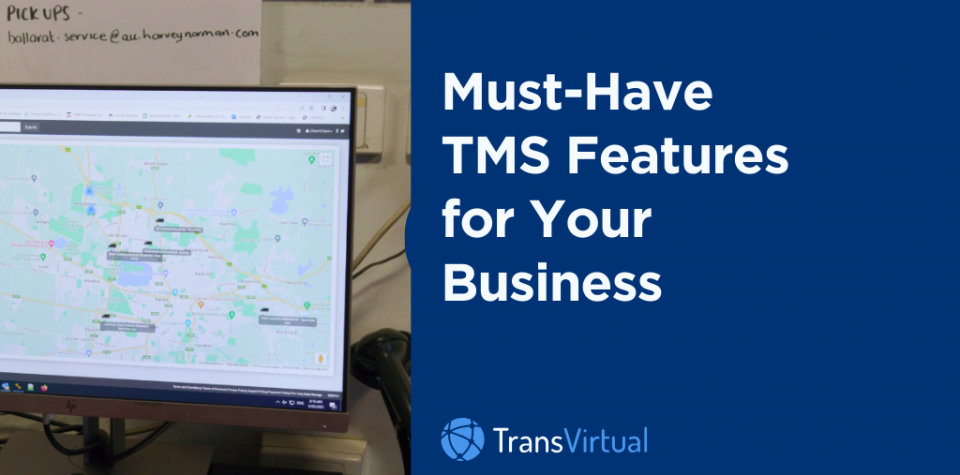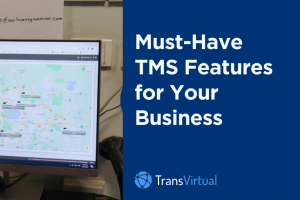Table of Contents
Logistics has become so fast-paced that without efficient transportation management, your company can scarcely be competitive. Our supply chains are more complex than ever, and so are customer expectations.
That’s what makes selecting the right Transportation Management System (TMS) so critical. It can unlock a wealth of opportunities by streamlining your operations – optimising your supply chain visibility, boosting profits, and reducing costs.
Even the most minor inefficiency can have rippling effects on your bottom line. But with an advanced TMS, your business can navigate transportation logistics with incredible efficiency. You’ll be empowered to make more data-driven decisions and respond with agility to changing market conditions.
From route optimisation to automated load planning, real-time tracking, carrier management, and more – this article is written to help you grasp everything the best TMS platforms have to offer.
Whether you’re a small startup or an established enterprise, check out the must-have features to look for in a TMS.
8 Features to Look for in a TMS
1. Route Optimisation
Successful logistics operations are entirely dependent on efficient transportation planning. Route optimisation enables businesses to plan and execute cost-effective and time-efficient routes for their fleets.
Your TMS should leverage advanced algorithms and real-time data to account for factors like traffic patterns, road conditions, delivery time windows, and more to determine optimal paths for every trip. Such a strategic approach reduces fuel costs by minimising mileage and idling time while improving delivery times, enhancing customer experiences, and strengthening your brand’s reputation.
2. Automated Load Planning & Job Assignments
Manual load planning and job assignments are time-consuming and seriously prone to errors. The best TMS platforms offer automated load planning and job assignment capabilities to streamline these critical operations. They’ll consider factors like vehicle capacity, driver availability, and delivery constraints to more efficiently allocate loads and assign jobs to the proper resources.
This automation minimises human errors, maximises asset utilisation, and ensures seamless delivery.
3. Analytics & Reporting
A comprehensive TMS provides robust analytics and reporting features based on hard, verifiable data. With access to real-time data alongside historical trends, your business can gain valuable insights into key performance indicators (KPIs) like on-time delivery rates, fuel consumption, and asset utilisation.
Such data-driven insights enable your business to identify bottlenecks, optimise processes, and more strategic decisions to improve operational efficiency and profitability. Plus, customisable reporting capabilities allow your business to tailor its analysis to specific needs – that way, you’ll always stay ahead of the curve in your industry.
4. Integration Capabilities
Modern businesses are full of siloed systems and disparate data sources that can hinder the efficiency of your operations and decision-making. With a top-tier TMS, you won’t have to worry about the integration process – it should connect with your existing systems and platforms seamlessly. You can expect easy data exchange across different applications like enterprise resource planning (ERP), warehouse management systems (WMS), and customer relationship management (CRM) tools.
Your TMS should integrate in such a way that it enhances collaboration, eliminates data silos, and increases productivity. Interconnectivity like this empowers your business to operate more cohesively and ensure real-time information flows throughout your supply chain.
5. Mobile-Ready Functions: Barcodes, ePOD, & Tracking
Your business is always on-the-go – it’s literally the name of the game. Thus, your TMS should cater to evolving needs. Mobile-ready features like barcode scanning, electronic Proof of Delivery (ePOD), and real-time tracking are essential for your business to maintain visibility and control over your logistics processes.
Barcode scanning streamlines tracking for shipments and assets, minimising errors and improving inventory accuracy. ePOD eliminates the necessity of paper-based documentation, ensuring delivery confirmations are captured digitally and shared with all stakeholders. Real-time tracking allows you to monitor the location and status of your fleet to enable proactive communication with customers and on-the-fly decision-making.
6. Carrier Management
Your business absolutely benefits every time you improve your carrier management process. With a robust TMS, you’ll gain comprehensive carrier management that enables you to streamline managing and collaborating with your carrier partners.
This feature lets you maintain up-to-date carrier profiles, track performance metrics, and ensure compliance with relevant regulations. Plus, carrier management tools facilitate the communication process by enabling you to negotiate rates, share load details, and coordinate pickups and deliveries with ease. When you optimise your carrier relationships, you can reduce transportation costs, improve services, and foster long-term partnerships that drive operational excellence.
7. Fleet Management
Managing your fleet efficiently is paramount if your company wants to optimise resource usage and minimise operational costs. Your TMS selection should provide integrated fleet management capabilities that enable total oversight and control over your vehicle assets.
This feature allows your business to track vehicle locations, monitor fuel consumption, and proactively schedule preventative maintenance. Using real-time data and advanced analytics, your TMS and its fleet management tools can identify underutilised assets, optimise routes, and make better decisions regarding vehicle acquisition or replacement. Additionally, automated driver performance monitoring can help your business identify areas for improvement, promote safe driving practices, and enhance your overall fleet efficiency.
8. Automated Billing & Invoicing
Accurate, timely billing is essential for maintaining healthy cash flow and positive customer relationships. Your TMS choice should offer automated billing and invoicing capabilities that streamline this process and minimise human errors.
By integrating with existing systems and leveraging real-time data, your TMS can generate invoices automatically, ensure charges are calculated correctly based on mileage, fuel surcharges, and additional services rendered.
Automated billing reduces administrative overhead, enhances customer satisfaction through transparent and accurate invoices, and facilitates prompt payments to strengthen trust between your business and your clients.
TransVirtual: The Right TMS for Your Business
At TransVirtual, we understand the complexities of the transportation industry and the challenges your business faces in managing your logistics operations. Our TMS is designed to address these challenges head-on, offering all the must-have features we’ve discussed today.
Don’t settle for subpar transportation management solutions. Schedule a strategy call with the TransVirtual team today to learn more and take the first step toward simplifying and enhancing your business.



